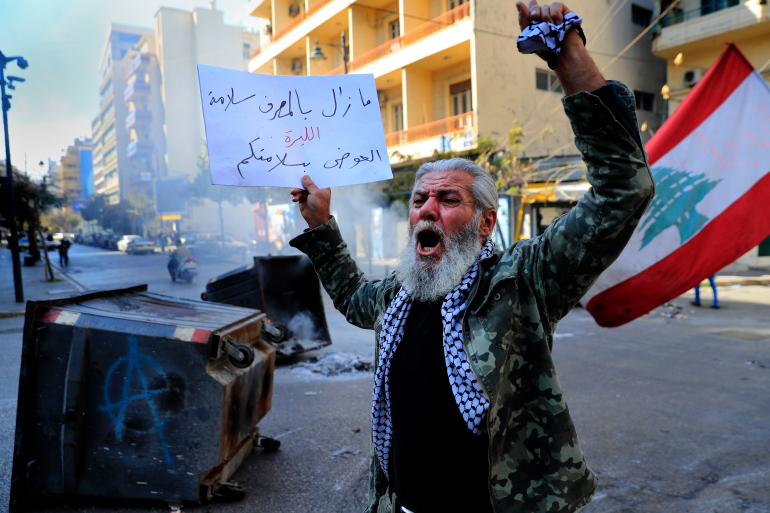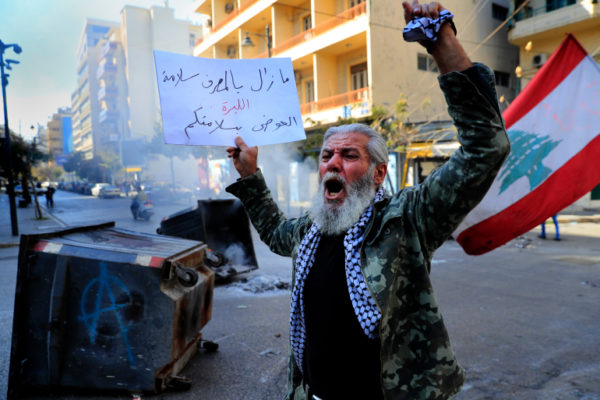People can’t get their money from banks, the currency has crashed and Riad Salameh’s reign at the central bank is facing allegations of fraud.
Riad Salameh, Lebanon’s central bank chief, told CNBC last year before the fraud investigations were announced that he would not resign over Lebanon’s financial troubles because he had a “strategy to get out of this crisis
By Ben Hubbard and Liz Alderman
BEIRUT, Lebanon — For decades, Riad Salameh, Lebanon’s central bank chief, was lauded at home and abroad as a financial wizard who kept the economy running and the currency stable despite wars, assassinations and frequent political turmoil.
Not anymore.
This country at the crossroads of the Middle East is suffering from a collapse of historic proportions: Its banks are largely insolvent, unemployment is soaring, its currency has crashed and many Lebanese blame Mr. Salameh for shortages that have left them struggling to afford food, scrambling to find medication and waiting in long lines to fuel up their cars.
Now, Mr. Salameh is being accused of a perhaps more unforgivable sin: enriching himself and his inner circle through years of corruption. Paris anticorruption judges opened an investigation this month into criminal allegations that Mr. Salameh, one of the world’s longest-serving central bank chiefs, fraudulently amassed an outsize fortune in Europe by abusing his power. The judicial investigation follows a preliminary inquiry by the French National Financial Prosecutor’s Office.
Prosecutors in Switzerland have asked Lebanese authorities for help with a separate investigation into suspected embezzlement and money laundering linked to Mr. Salameh and his associates.
The allegations have caused a sensation in a country enduring a crisis that the World Bank said recently could rank in the top three worldwide over the last 150 years, a “brutal” economic contraction of a magnitude “usually associated with conflicts or wars.”
Despite the meltdown, Mr. Salameh, the architect of Lebanon’s monetary policy since 1993, has faced no serious calls for his ouster, even though he oversaw a strategy that required ever more borrowing to pay existing creditors, what some critics have called the world’s largest Ponzi scheme.

What shields Mr. Salameh from scrutiny at home is his central role in Lebanon’s complex sectarian and often corrupt web of business and political interests. More than 20 interviews with Lebanese, Western and monetary officials, economists and former colleagues of Mr. Salameh’s paint a picture of a brilliant and shrewd yet secretive operator who built an empire inside the central bank and used it to make himself essential to rich and powerful players across Lebanon’s political spectrum.
“He is no longer the head of the central bank. He is the accountant for this mafia,” said Jamil al-Sayyed, a member of Parliament and former head of Lebanon’s General Security agency, the body that oversees domestic security and issues identity cards and passports. “He protects them, and in protecting him, they protect themselves.”
But the investigations in France and Switzerland pose new threats to his standing.
The French judges are investigating a complaint by Sherpa, a French anticorruption group, that accuses Mr. Salameh, his brother Raja Salameh, other relatives and Marianne Hoayek, who heads the central bank’s executive office, of illicitly sweeping funds from Lebanon into Swiss banks and then laundering millions in France through high-end real estate purchases, including luxury property near the Eiffel Tower. The judges have broad powers, which include seeking cooperation from the Lebanese authorities and freezing assets if the origin of their funding appears illegal.
Mr. Salameh’s lawyer in France, Pierre-Olivier Sur, said Mr. Salameh disputed the entirety of the allegations.
Separately, the Swiss attorney general’s office is examining a web of bank accounts from Switzerland to Panama that it says Mr. Salameh and his brother may have used to shelter the “possible embezzlement” of central bank funds and to “carry out money laundering.”
Swiss prosecutors, who are basing their investigation on a complaint brought by Accountability Now, an organization established in 2020 by Lebanese and Swiss human rights activists, say documents show that Mr. Salameh hired Forry Associates, a brokerage firm owned by his brother, to handle central bank sales of government bonds, and that from 2002 to 2015 the bank transferred at least $330 million in commissions to the firm’s Swiss account. Mr. Salameh has said that the contract was legal.
Large sums in the Forry account were moved to Swiss accounts held by Mr. Salameh, and a portion of the money was ultimately used to buy millions of euros’ worth of real estate in France, Germany, Britain and Switzerland, Swiss prosecutors said.
Beyond the real estate, Swiss prosecutors are looking into allegations that Raja Salameh transferred over $200 million from Forry’s Swiss account to his accounts in Lebanese banks with powerful political ties. Among them was Bankmed, owned by the family of Rafik Hariri, the former Lebanese prime minister who appointed Mr. Salameh as central bank chief, and whose son Saad Hariri is the country’s most prominent Sunni Muslim politician.
Neither Mr. Salameh nor his brother or associates have been charged by Swiss or French prosecutors. It is unclear how long the investigations will take.
Talk of self-dealing by Mr. Salameh has circulated for years. In the WikiLeaks diplomatic cables, a former U.S. ambassador to Lebanon, Jeffrey Feltman (now special envoy for the Horn of Africa), described Mr. Salameh in 2007 as having “whiffs of rumored corrupt behavior, a penchant for secrecy and extralegal autonomy at the Central Bank.”
Mr. Salameh, 70, declined to be interviewed for this article, did not respond to written questions and has denied any wrongdoing. He has repeatedly said he accumulated a personal fortune of $23 million during a 20-year career as a banker at Merrill Lynch before being tapped to head the central bank. Raja Salameh could not be reached for comment.
Riad Salameh told CNBC last year before the investigations were announced that he would not resign over Lebanon’s financial troubles because he had a “strategy to get out of this crisis.” He defended his record, saying he had kept Lebanon “afloat while it lived wars, assassinations, civil strife and so on.”
“It is really unfair to judge Lebanon as if it was Sweden,” he said.
But some Lebanese question how Mr. Salameh can remain at the helm of the central bank. Inflation has surged to 80 percent, overseas investors have left and more than half of the country’s 6.7 million people may be living below the poverty line, the World Bank said.
“He is responsible for monetary policy, and it has failed dramatically,” said Henri Chaoul, a former adviser to Lebanon’s minister of finance who resigned last year. “Under what rules of law and governance is he still around?”
A polished, canny political operator who is a Lebanese-French dual citizen, Mr. Salameh has been enmeshed in Lebanon’s politics since Rafik Hariri named him central bank governor in 1993. Mr. Salameh had been Mr. Hariri’s private banker at Merrill Lynch.
Mr. Hariri was trying to rebuild Lebanon after a disastrous 15-year civil war, and Mr. Salameh set out to stabilize the currency and reel in foreign investment.
Mr. Salameh fixed the Lebanese pound at about 1,500 to the dollar, a peg that would underpin the economy for more than 20 years but required a constant stream of dollars to stay sustainable.
The system was fragile because it risked collapse if the money ran out. But every time Lebanon faced new crises, external help kept coming. The assassination of the elder Mr. Hariri in 2005 and a destructive war between the Lebanese militant group Hezbollah and Israel in 2006 brought inflows of international aid.
Wealthy members of the Lebanese diaspora continually sent foreign currency home.
Mr. Salameh’s supporters hailed him as a skilled savior for keeping the economy stable in a country where nothing else seemed to be. As governments came and went, running chronic budget deficits, Mr. Salameh held fast to the money reins.
In Lebanon’s sect-based political system, the president must be a Maronite Christian, which Mr. Salameh is, and his reputation as a financial mastermind at one point made him a contender for the country’s highest office. He once told a businessman who asked about his economic plans, “Get me the presidency and I’ll tell you.”
Mr. Salameh also used his post to do favors for power brokers in Lebanon’s political system, according to former central bank employees and foreign officials who spoke on the condition of anonymity. Sons of prominent officials got jobs at the central bank. Businessmen, politicians and journalists producing favorable coverage allegedly benefited handsomely from central bank-subsidized loans and other financial arrangements that most likely would have raised red flags with regulators in other countries
But after decades of relative stability, Mr. Salameh’s system began to unravel. By 2015, Lebanon’s ratio of debt to economic output — a measure of debt’s burden on a nation’s economy — was the third highest in the world, at 138 percent; when Mr. Salameh took office, it was 51 percent, ranking 97th. Next door, a civil war was raging in Syria, raising fears of instability.
Commercial banks, saddled with risky Lebanese sovereign bonds, had been required to keep 15 percent of foreign currency deposits in the central bank to shore up its reserves, and Mr. Salameh attracted further deposits with even higher interest rates.
Interest rates on dollar deposits at commercial banks also rose, in some cases to 20 percent or higher, to attract dollars in what some analysts describe as a Ponzi scheme, in which new money was always needed to pay creditors.
In late 2019, the system came crashing down. Banks imposed limits on withdrawals and the central bank began dipping into its reserves, which included large amounts of depositors’ money, to maintain the currency’s peg to the dollar. Antigovernment protesters set fire to A.T.M.s, and banks locked their doors.
“As long as the system was working, no one cared,” said Dan Azzi, a former Lebanese banker. “Now that it has failed, everyone is angry.”
The government’s default on a $1.2 billion bond payment in March 2020 underscored the collapse. “Our debt has become greater than Lebanon can bear,” Prime Minister Hassan Diab said in a televised speech.
The coronavirus pandemic and a huge explosion in the port of Beirut last August further devastated the economy.
Estimates put the central bank’s losses at $50 billion to $60 billion. The International Monetary Fund has offered assistance, but Lebanese officials accuse Mr. Salameh of blocking an audit sought by the United States and other countries that would unlock I.M.F. aid, as well as a separate investigation into alleged fraud at the central bank.
Most Lebanese have said goodbye to whatever savings they had while the currency has crashed, reducing salaries once worth $1,000 a month to about $80. The central bank is burning through its reserves, spending about $500 million per month to subsidize imports of fuel, medicine and grain.
“Lebanon has been living on borrowed time, and now the chickens have come home to roost,” said Toufic Gaspard, a Lebanese economist and former adviser at the I.M.F. “The whole banking system has collapsed, and we have become a cash economy.”
The crash has soured many Lebanese on their once celebrated central banker.
“I can’t say anything good about Riad Salameh,” said Toufic Khoueiri, a co-owner of a popular kebab restaurant, while having lunch with a friend in Beirut. “Our money is not stuck in the banks, but simply stolen.”
His friend, Roger Tanios, a lawyer, said he had once admired Mr. Salameh for keeping Lebanon financially stable but had changed his mind.
Mr. Salameh, he said, had gone spectacularly off course.
“Every country has its mafia,” Mr. Tanios said. “In Lebanon, the mafia has its country.”
New York Times


Leave a Reply
You must be logged in to post a comment.